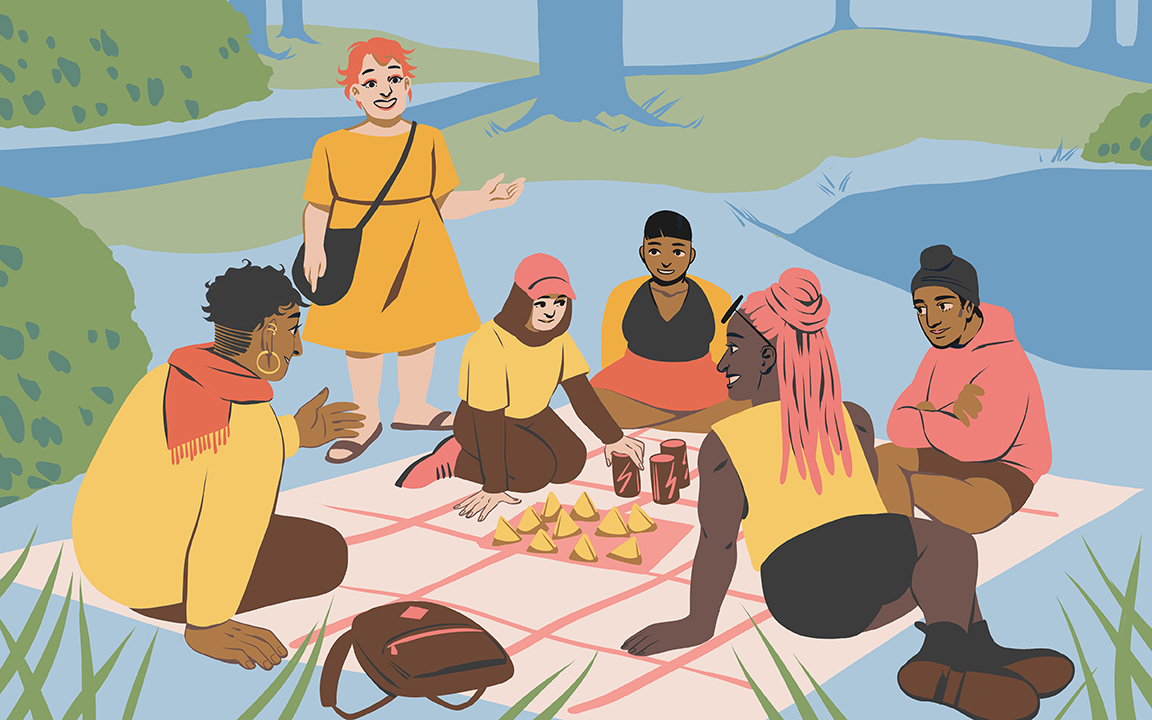Newcomers & refugees
Find your way around B.C.’s health care system and explore transgender, non-binary and Two-Spirit newcomer resources.

Understanding B.C.’s health care system
Adapting to a new medical system can be challenging.
B.C. offers various health services, including mental health support, public health clinics, and specialized services. Learn about the B.C. healthcare system, how to find a doctor, get a referral, access support and more in our How to Get Care section.
Helpful documents in multiple languages
To help you learn about Canadian health care and find the services and support you may need, Trans Care BC has guides available in several languages:
- Our Services – English version
Arabic version | Chinese (Simplified) version | Chinese (Traditional) version | French version | Spanish version - Gender Inclusive Language for Everyone – English version
Arabic version | Chinese (Simplified) version | Chinese (Traditional) version | French version | Spanish version - Supporting Children, Youth, & Parents – English version
Arabic version | Chinese (Simplified) version | Chinese (Traditional) version | French version | Spanish version - Gender-Affirming Parenting Guide – English version
Arabic version | Chinese (Simplified) version | Chinese (Traditional) version | French version | Spanish version - Accessing gender-affirming care on the Interim Federal Health Program – English version
Arabic version | Chinese (Simplified) version | Chinese (Traditional) version | French version | Spanish version - Self Advocacy: Talking About Gender-Affirming Care With Your Provider – English version
Arabic version | Chinese (Simplified) version | Chinese (Traditional) version | French version | Spanish version - Self Advocacy: Finding A Care Provider – English version
Arabic version | Chinese (Simplified) version | Chinese (Traditional) version | French version | Spanish version - Self Advocacy: Starting Hormone Therapy – English version
Arabic version | Chinese (Simplified) version | Chinese (Traditional) version | French version | Spanish version - Self Advocacy: Referrals – English version
Arabic version | Chinese (Simplified) version | Chinese (Traditional) version | French version | Spanish version - Self Advocacy: In Hospitals and Doctor's Offices – English version
Arabic version | Chinese (Simplified) version | Chinese (Traditional) version | French version | Spanish version
How to register for health care
Canada has health care programs that cover the cost of necessary medical, surgical, and dental care. This coverage includes some gender-affirming care Processes through which a health care system cares for and supports an individual while recognizing and acknowledging their gender and expression. .
Those two programs are:
- B.C’s Medical Services Plan (MSP) — Learn what MSP The Medical Services Plan (MSP) is a B.C. government health plan that pays for physician services and referred services that are considered medically necessary, such as specialists (surgeon, psychiatrist, etc.), diagnostic x-rays, or laboratory services, for all BC residents. Some residents qualify for premium assistance for physiotherapy, chiropractic, naturopathy, massage therapy and acupuncture. covers in the How to Get Care section of our website.
- Interim Federal Health Program (IFHP) — Learn more about IFHP Interim Federal Health Program. This is a limited and temporary health care plan that provides health care coverage to some groups of foreign nationals who are vulnerable, disadvantaged or ineligible for provincial or territorial health insurance. below.
Get temporary health care benefits
If you’re a newcomer, and have an Acknowledgement of Claim, you will automatically be enrolled in the temporary health care plan called IFHP.
While waiting for your MSP coverage to start, you can use the temporary health benefits offered through the IFHP.
IFHP Eligibility
As benefits and eligibility may change over time, consider contacting the organizations listed below for confirmation of current details.
To find out if you are eligible, visit this IFHP page or call Medavie Blue Cross at 1-888-614-1880 (08:30 to 16:30 in each Canadian time zone).
What’s covered through the IFHP?
The IFHP provides temporary Canada-wide health care coverage for some newcomers and refugees. Through the IFHP, you receive two types of coverage:
- Basic coverage includes things like a visit to a doctor, blood test or a hospital visit. This coverage lasts until you have MSP coverage in place.
- Extended coverage covers costs for things such as medication, counselling, optometry, dental, physiotherapy and more. This coverage lasts one year or the duration of a refugee claim or sponsorship agreement.
For individuals seeking gender-affirming care, IFHP coverage includes:
- Visits to a
primary care provider
A person’s main health care provider in non-emergency situations such as check-ups and referrals. Family doctors, general practitioners (GPs) and nurse practitioners (NPs) are all primary care providers.
or specialist (such as an
endocrinologist
A doctor specially trained in the study of hormones and their actions and disorders in the body.
) registered with the IFHP. A provider or specialist can support you with:
- Starting hormone therapy
- Continuing hormone therapy that has already been prescribed
- Provide your surgical readiness assessment An evaluation conducted by a health care professional to determine if a patient is ready to begin hormone therapy or have gender-affirming surgery. or refer you to someone who can
- Referring you for gender-affirming surgery
- Hormone prescriptions
- Please note that certain forms of hormone therapy may not be covered, and there may be difficulty accessing coverage for hormone prescriptions through the IFHP.
For support finding an IFHP-registered provider, contact Trans Care BC.
The IFHP does not cover the following:
- Consults for gender-affirming surgery
- Gender-affirming surgery
These services are available once you have MSP coverage.
Who can access IFHP?
You can access IFHP benefits in two ways:
1. You are a newcomer and you apply for refugee/protected status
The Government of Canada provides information about applying for refugee/protected status in Canada. Enrollment to the IFHP is automatic; once you submit this claim, you will receive a confirmation letter, called Acknowledgement of Claim.
This letter will have your IFHP number; it is the same as your Unique Client ID (UCI) number. You might be asked for this number to access Trans Care BC services, so keep it safely stored somewhere.
Rainbow Refugee Society offers support, guidance and information about submitting a refugee claim based on sexual orientation Refers to terms such as lesbian, gay, straight, and queer, which are based on patterns of emotional, romantic, and/or sexual attraction to groups of people. Sexual orientation terms are commonly (but not always) defined by the gender(s) of the people that the individual is attracted to. Sexual orientation also refers to a person’s sense of identity based on those attractions, related behaviors, and membership in a community of others who share those attractions; for example pansexual, bisexual, LGB, heterosexual. , gender identity A person's deeply held, internal sense of themself as male, female, a blend of both or neither. (Source: GenderSpectrum.org) , gender expression How a person outwardly communicates their gender, including name and pronoun choice, style of dress, and voice modulation. (Source: QMUNITY) and sex characteristics (SOGIESC). Contact Rainbow Refugee if you need support with this process.
2. You come to Canada under a Government Assistant Refugee or Private Sponsorship program
Your IFHP coverage starts before you arrive in Canada.
Once you land, and successfully receive your PR card, apply for MSP right away. Some people mistakenly believe new applicants must wait for three months before they can apply for MSP. The MSP processing time used to be three months, but approvals take less time now.
Accessing gender-affirming care under the IFHP
In general, there are up to three steps to getting gender-affirming care with IFHP coverage:
1. Find an IFHP-registered health care provider.
Use the IFHP Provider Search Tool to find a list of all registered providers by location. Please note this list does not detail whether a provider is able to support gender-affirming care.
The Trans Care BC health navigation team can help you understand which providers may be able to support your gender-affirming care and how to communicate your care needs to them.
Make sure to have the provider confirm IFHP coverage when you reach out to them. IFHP does not reimburse patients, regardless of what the service provider might tell you. Always confirm your coverage to avoid any unexpected payments.
2. Speak with your provider about the health care you are looking for.
Once you have an IFHP-registered provider, you can speak with them about the gender-affirming care you need or have questions about.
Your provider may or may not have experience providing gender-affirming care. If your provider needs more information about delivering gender-affirming care they can contact RACE or eCASE or the Trans Care BC health navigation team.
Speaking about personal and gender health information with a provider can be challenging. If you are having difficulty communicating with a provider about the care you seek, please contact Trans Care BC.
3. Learn your options for hormone therapy or surgery
Your health care provider may prescribe hormone therapy for you directly, or they may need to refer you elsewhere. Your provider can contact the Trans Care BC health navigation team or RACE or eCASE if they need assistance delivering hormone care.
Your provider can also explain your surgical options and the process required to access particular surgeries. Read our surgery guides to learn more.
Please note you can access surgical care planning Process that a person, their health care providers, family and other supporters undertake in planning to reach their gender-affirming care goals. , receive a surgical recommendation and be referred for surgery while on the IFHP. However, you need MSP coverage to access surgery.
What you need to know about IFHP
- When using IFHP coverage, make sure all health care providers you see at each stage (including referrals) are IFHP-registered. Treatments offered by providers who are not IFHP-registered will not be covered.
- The IFHP does not have a system to pay patients back for treatments, even if the IFHP covers them. Do not pay for these services with your own money because the IFHP will not reimburse you. Have your health care provider check with the IFHP to confirm coverage before paying. Your provider should send the bill directly to the IFHP.
- If you did pay for services out-of-pocket, you may ask the provider or pharmacy to bill the IFHP for the treatment and reimburse you once they receive payment. This arrangement may be possible in some circumstances.
- Most treatments require laboratory testing, such as blood tests. Although these tests should be covered, patients have had to pay out-of-pocket and have been unable to get reimbursed from the IFHP or LifeLabs. We hope this changes, but for now you should be prepared to pay for these tests.
Support organizations for newcomers
Rainbow Refugee Society
Rainbow Refugee is a Vancouver community group that supports people seeking refugee protection because of persecution based on sexual orientation, gender identity or HIV status. Rainbow Refugee offers outreach, advocacy and public education on LGBTQI+ and HIV+ refugee issues.
Two helpful programs through Rainbow Refugee are:
- Time to Thrive (T2T) program — Rainbow Refugee's T2T program recognizes the need for comprehensive emotional, social and mental support that contribute to overall well-being. This program helps support newcomers in pursuing and thriving in their life goals. The T2T program includes several resources, including:
- Financial assistance
- Mental health support
- Psychosocial support
- Housing navigation
- Access to various communities of belonging
- Access to referrals
SuperCrew program — The SuperCrew program is specifically for trans and gender diverse Refers to gender roles and/or gender expression that do not match social and cultural expectations. refugees and newcomers to help build and foster a sense of community and belonging. Each month, this program offers:
- Support groups that are open to all individuals identifying as transgender or gender diverse refugees. Please email support@rainbowrefugee.ca or info@rainbowrefugee.ca for more information about how to get involved.
- Empowerment sessions that are exclusively for Rainbow Refugee's Cohort of transgender and gender diverse community leaders. There is a vetting system to ensure a safe environment involving multiple meetings before granting access. These sessions serve as an advisory group for shaping SuperCrew future programming and Rainbow Refugee’s advocacy plans.
SuperCrew also features a transgender and gender-diverse peer-based donation train. Items offered by this donation train can include post- top surgery Refers to some gender-affirming above-the-waist surgeries, including chest surgeries and breast surgeries. pillows, binders, sports bras, sealed/new packers, sealed/new gauze, clean button-up shirts, and other equipment that Rainbow Refugee carefully vets. Availability of those items is not always guaranteed, depending on funding and inventory.
Additionally, Rainbow Refugee provides information to asylum seekers outside Canada and is a sister organization of LEGIT: Canadian Immigration for Same-Sex Partners.
Immigrant Services Society of British Columbia (ISSBC)
ISSBC has programs and resources for refugees, women, children and youth, with services available throughout metro Vancouver, Squamish and the Okanagan.
The program has support services in over forty-five languages and can help you:
- Find a job
- Get settled in your home and find a community
- Learn English
- Start a business
Mosaic
Mosaic is a multicultural non-profit organization that welcomes and supports newcomers and refugees as they start their lives in Canada. This organization can help you find employment and housing, fill out newcomer forms and paperwork, apply for government support and more.
The organization’s I Belong Program is a great resource for newcomers. It offers:
- Community support and peer meet-ups
- One-on-one help to learn how to settle into life in Canada
- Referrals for various needs
- Counselling services
Catherine White Holman Wellness Centre (CWHWC)
CWHWC is an organization that aims to provide low-barrier health services for all transgender, Two-Spirit A term used within some Indigenous communities to reflect complex Indigenous understandings of gender and sexuality and the long history of sexual and gender diversity in Indigenous cultures. Two-Spirit encompasses sexual, gender, cultural and spiritual identity. It may refer to cross-gender, multi-gender or non-binary gender roles, non-heterosexual identities, and a range of cultural identities, roles and practices embodied by Two-Spirit peoples. Some people also use "2-Spirit" or "2S." (Source: Battered Women’s Support Services) and non-binary Umbrella term referring to people whose gender does not fall within the binary gender system of woman/girl or man/boy. Some individuals identify as non-binary while others may use terms such as gender non-conforming, genderqueer, or agender. Non-binary people may or may not conform to societal expectations for their gender expression and gender role, and they may or may not seek gender-affirming medical or surgical care. people. Services through CWHWC are free and can be used no matter your citizenship or health insurance status.
They offer primarily legal services such as updating your name and gender marker The sex marker on identification or documents. Can be M, F or X. on your identification, general legal advice, or hormone and surgery readiness assessments. Request an appointment through their portal to access the services.
You must have a primary care provider before requesting an assessment for hormones or surgery. CWHWC cannot provide assessments for vaginoplasty A gender-affirming genital surgery to create a vulva (including mons, labia, clitoris and urethral opening) and vagina. , vulvoplasty A gender-affirming genital surgery to create a vulva (including mons, labia, clitoris and urethral opening) and remove the penis, scrotum and testes. Vulvoplasty creates the external aspects of a vulva without creation of a vaginal canal. , phalloplasty A gender-affirming lower surgery to create a penis and scrotal sac (phase 1) followed by testicular implants and implants to obtain rigidity/erection (phases 2 and 3). , metoidioplasty A gender-affirming lower surgery to create a penis. Metoidioplasty involves cutting ligaments around the clitoris to add length to the shaft and grafting skin around the shaft to create more girth. Optional additional procedures include scrotoplasty and urethral lengthening. and erectile tissue release This procedure creates a penis by cutting the ligaments around the erectile tissue (clitoris), so the shaft falls away from the body, giving it a more pronounced appearance. .
Advocacy resources
In Canada there are certain laws to protect trans, non-binary, and Two-Spirit people, including rights about access to health care. Some informative links include:
- Trans Rights BC — Learn your rights as a trans, non-binary or Two-Spirit newcomer to the province.
- The Residents Bill of Rights — Learn your rights as a patient.
- British Columbia Health Care Policies and Standards — Read the policies and standards that apply to health care in B.C.
Other helpful links
Capital Rainbow Queer Refugee Hearings Program Toolkit — This informative guide can help you prepare your refugee claim based on sexual orientation, gender identity and expression, or sex characteristics.
Peer Support Directory — Use this Trans Care BC resource to locate additional peer support groups in your community.
Contact our team of experienced health navigators for information about gender-affirming care in B.C.
Community Voices

Embarking on the journey to access gender-affirming care in Canada was a rollercoaster of emotions. I was surprised by the hurdles trying to access vital care. Once I pushed through those early challenges, the path became remarkably smoother. Finding a family doctor and getting referred marked a turning point, and the speed at which things progressed pleasantly surprised me.
—B, on adjusting to Canada’s health care system

Some newcomers may not know their rights as a patient. If you go to a clinic or to a lab and the person you’re dealing with makes you feel unsafe or uncomfortable, you can ask to speak with somebody else. If there’s a language barrier, you can also request to have a translator or information in your first language.

